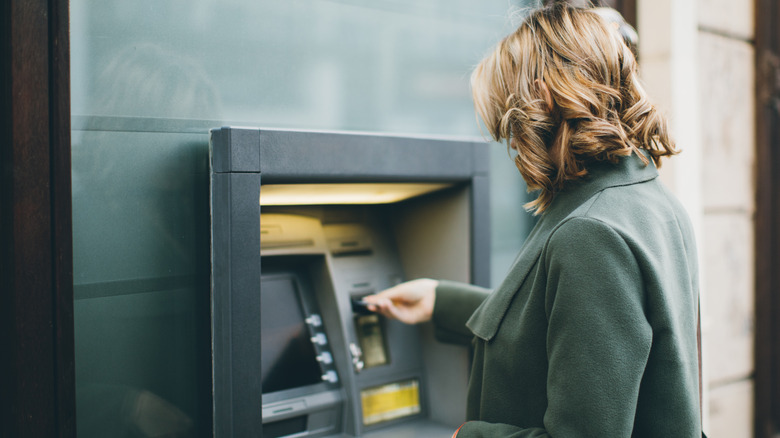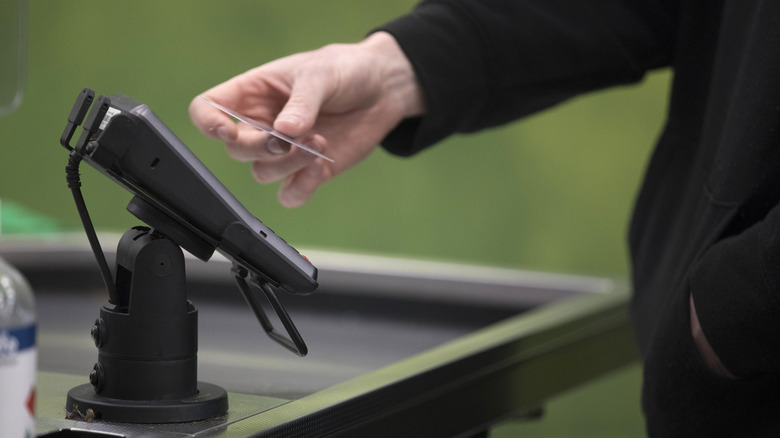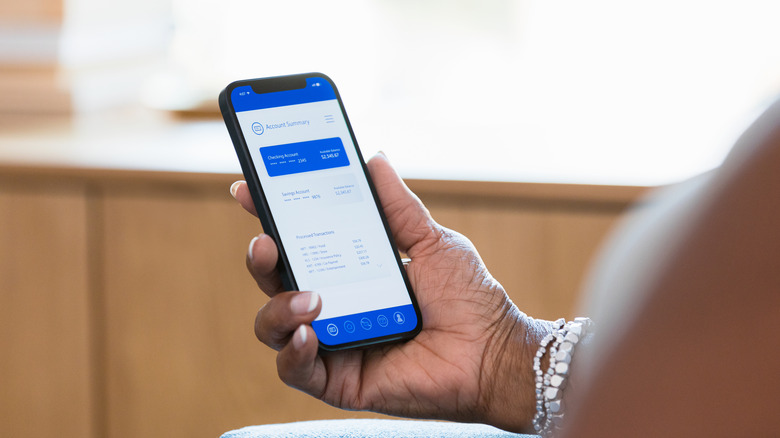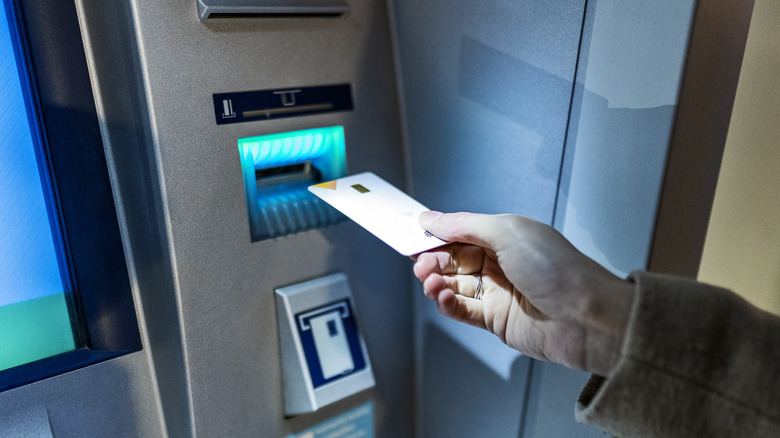Why You Should Always Shop Around Before Choosing A Bank
Even though it might not be the most entertaining way to spend your time, researching the right bank can ultimately have a significant impact on your financial future. While it can be tempting to just get an account with whatever bank is closest to you geographically (and physical proximity can definitely be an important factor), looking over a potential bank's account options ahead of time can be the key to finding a bank that will best fit your actual financial needs. Whether you are looking to open a bank account for the very first time, you've moved to a new city, created a new savings plan, or even if you're looking for a new joint account with a partner — shopping around before joining a new bank is absolutely essential.
With that said it can feel overwhelming to know what to look for in a new bank. Between fees, account types, credit cards, and even ATM access it can be difficult to know what options to prioritize when it comes to your banking needs. With that in mind, investigating all of your options before selecting one can ensure you don't end up regretting your bank decision. Also, having an idea of your future financial goals can also be extremely helpful as you narrow down what banking options might work best for you. Let's dive into some of the most important options to consider when looking at a new bank, so you can best determine what is most important to you.
Fees
Easily the least pleasant part of banking is the associated fees that can come with the process. From monthly fees to balance requirements to overdraft and late payment fees, knowing what you might be on the hook for ahead of time can better prepare you for any mishaps that might happen. Finding an account without monthly fees can be an easy way to help you save some extra money. Other fees that could be relevant to your banking needs include wire transfer fees and foreign transaction fees. If you regularly send money (make sure you know these things before wiring money) or travel, making sure to look into the associated fees with these options can be important when deciding on a new bank.
It's also important to make sure to take a look at any fees associated with closing an account at a given bank. This can be useful to look into at both your existing bank (if you are looking to move) and/or a new bank you might want to try out. Before committing to any bank changes, make sure you know exactly how much it will cost to close your existing and future accounts. Oftentimes banks will charge an early closing fee for any accounts closed within 90 to 180 days of the account opening. This is important to remember if you end up changing your mind about a new bank. Making sure to wait until after the allotted time the bank dictates can save you money.
Credit card options
Many banks offer exclusive credit card options to their customers. These credit cards can offer perks, points, and even cash back. Some of these perks have gotten creative, ranging from free Doordash DashPass subscriptions to cell phone protection coverage. Finding perks that fit your lifestyle can be a beneficial way to get even more from your credit card.
It's important to look into the annual fees associated with these bank-specific credit cards and to be aware of the APR rates associated with them (aka the interest rate you'll pay on purchases you don't pay off in full every month). This can help you determine if the credit card is right for you. Plus, make sure you have a good understanding of your current credit score as well as the credit score requirements for any credit card you might be interested in applying to. It's important to remember that many credit card applications can hurt your credit score, so make sure to only apply if you're pretty sure you'll qualify.
For those who regularly travel, finding credit card options without international transaction fees can also be an especially important consideration. These fees can range from 1-3% and can add up fast on purchases during trips. Similarly, credit cards with perks and points associated specifically with travel can be an easy way to help make your trips more budget-friendly long term. Earning travel miles and points from travel-specific purchases can be a key perk to look for when researching credit card options.
APY and Savings
For those looking for low-risk ways to help their money grow, high-yield savings accounts can be an important factor in determining what bank to join. Making sure to find a savings account with a return rate that outpaces the current inflation rate (which, as of October 2023 is 3.7%) can be important in ensuring you maintain your buying power. It's also important to know that most of the larger brick-and-mortar style banks with physical branches (think Chase, Bank of America, etc.) often offer far lower rates on savings accounts than online banks. The average rate on a savings account among traditional brick-and-mortar banks is only 0.22% whereas some online banking institutions offer over 5%.
Some banks also offer multiple savings account options and/or even side accounts within your existing savings account to help you set separate certain amounts. This can be beneficial for anyone who wants to ensure a certain amount of savings is being put away for something specific, perhaps for an upcoming purchase or even for a down payment on a house. Plus, since FDIC insurance only covers up to $250,000 per account, having multiple accounts can be a great way to spread out your savings and still ensure financial protection. With that in mind, some digital banks offer side or extension holdings (SoFi refers to them as Vaults) within your same account. These serve as a better way to organize and delineate your money (thereby ensuring you meet your savings goals) without needing multiple accounts.
ATM availability
ATM fees can add up fast, especially for those who prefer to use cash for purchases. While larger brick-and-mortar banks will often have more ATM locations than smaller or digital banks, it's important to look at the fees for using a "foreign" or out-of-network ATM. Most brick-and-mortar banks allow no-fee ATM use on their owned ATMs while digital banks will often contract with ATM providers, offering no-fee ATM use on certain branded ATMs for customers needing cash withdrawals. Another option offered by some banks and credit unions is to provide a reimbursement amount for ATM fees, with varying limits on reimbursement amounts per month. Most banks will have information on their ATM availability, network size, and associated fees on their website. If you anticipate needing regular ATM access, make sure there are plentiful ATM options in your geographic area before deciding on a specific bank.
ATMs can also be relevant for those who regularly make deposits and don't want to go into a specific bank branch. Digital banks often do not accept cash deposits due to a lack of both physical locations and in-house ATMs, so if regular cash deposits are a part of your banking needs, it might be better to stick to more traditional banks. It's also important to look at the mobile deposit rules for a new bank, including if checks are accepted, and if there are any monetary limits to mobile deposits.
Account options
Perhaps one of the most important things to research when it comes to a new bank is its account options. Whether you need checking and savings or are looking for CD and money market account options, knowing what is available to you can help you decide which bank might best serve you. Custodial and joint account options can also be important to families with kids or couples looking to combine their finances. Making sure to look into how many accounts you can have within a single bank can be a good indicator of whether the bank will fit your needs. Banks that only allow a single or joint account per user might not work for people who wish to have multiple accounts for their funds. Plus, it can be beneficial to have multiple savings accounts, so researching your options is important.
Another important consideration can be account types with special services. Whether that be Senior, Student, or even child accounts — many of these specialty accounts can offer lower associated fees, lower account balance requirements, and even free or reimbursed ATM fees. These accounts can be beneficial for groups that need a little extra help saving money. Student account options in particular can be worth investigating for college students looking to take advantage of perhaps their first bank account while they are studying full-time.





